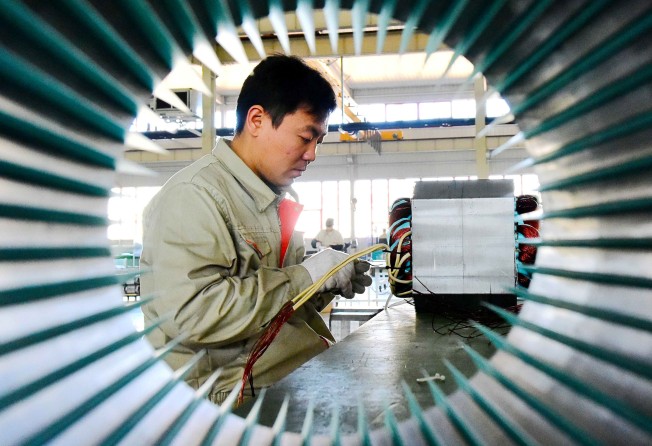China economy endures bad start to 2019 as private data highlights weakening manufacturing sector
- Caixin Purchasing Managers’ Index dropped 0.6 points to 49.4 in December, contracting for the first time since May 2017
- Follows release of official figures compiled by the National Bureau of Statistics, which dropped 0.6 to 49.4 last month, its first contraction since July 2016

China’s slim hopes of an economic upturn in 2019 suffered a blow on the first working day of the new year as a privately compiled economic gauge showed signs of weakening manufacturing activities.
The Caixin Purchasing Managers’ Index (PMI), which tracks the activities of small and medium-sized enterprises, dipped below 50.0 for the first time since May 2017 as December’s reading fell 0.5 points to 49.7.
A drop below 50.0 indicates contraction compared to expansion.
It follows Monday’s release of the official PMI compiled by China’s National Bureau of Statistics, which recorded a drop of 0.6 to 49.4 last month, its first contraction since July 2016.
The PMI is usually an advance indicator of China’s industrial production, trade activities, employment and business confidence.
Serena Zhou, an economist at Mizuho Securities in Hong Kong, said that the lower than expected results suggested further weakness in the future and that “the worst is yet to come”.
The PMI figures indicated subdued domestic demand and reduced front-loaded shipments to the United States looking to avoid potential tariff increases in the new year, despite more fiscal spending that has driven up fixed-asset investment, she pointed out.
“The economic figures could get worse in upcoming months. The market confidence hit hard by the China-US trade war remains and has not recovered,” Zhou added.
The benchmark Shanghai Composite Index dropped after the latest PMI figures were released, cancelling out early gains on the first day’s trading of the new year.
China has shifted its priority to economic stabilisation in 2019 after last month’s Central Economic Work Conference pledged to develop a stronger home market to offset external uncertainties.
The key meeting to chart economic policies for 2019 also vowed to stabilise the economy, finance, trade, investment, employment and market expectations.
Ding Shuang, chief Great China economist at Standard Chartered Bank, said Beijing’s policymakers will face a big test at the end of the first quarter when the data shows the economy has slowed further.
The current 90-day truce with the United States is also set to expire on March 1, with US$200 million of Chinese imports to the US threatened with a tariff increase from 10 per cent to 25 per cent.
The market had widely expected a slowing economy due to the trade war, but its damage is now not just confined to the trade sector, but it has already affected domestic manufacturers and external demand, Ding added.
He also warned “the government countermeasures have not yet been able to fully offset the impact”, and that “they will need a period of time to take full effect”.
Ding said Beijing can still boost its credit growth, an important tool to stabilise investment, but it remains reluctant to ease restrictions on property, a key pillar industry of the national economy, to a large extent.
Currently, it prefers the loosening of the purse strings, with more pre-tax deductions from the start of the year and an earlier allocation of local government bond quotas to maintain construction momentum.
It is also expected to lower the 2019 growth target and raise the fiscal deficit ratio, both of which will be officially decided at the Two Sessions meeting in March.